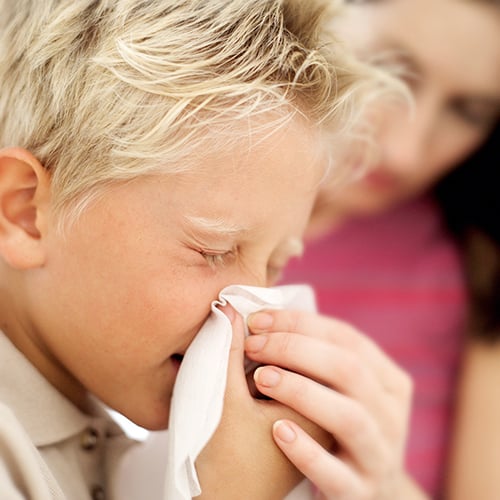Vomiting in Children
Vomiting can be caused by a wide variety of conditions such as gastrointestinal disorders (i.e. diarrhea, intestinal obstruction), nervous system diseases (i.e. meningitis, brain tumor, hydrocephalus), metabolic syndromes or some medications. However, vomiting can be occurred without any physical illness; especially in babies or children with overfeeding, not burping your babies after feeding or inappropriate feeding position such as drinking while lying down on their backs instead of lying down on his side in your arms.

Vomiting is a common symptom that everyone will feel for a short time at some point in their lives. Vomiting often has a benefit since it provides a way for the body to get rid of potentially harmful substances and helps you feel more comfortable in stomach, body and mind. Sometime, it is a sign of abnormal. Therefore, we can prevent and treat ourselves before the problem spread out.
However, severe and persistent vomiting may cause tears in esophagus, bleeding, fluid and electrolyte loss, dehydration, imbalance in the body. Moreover, vomiting may also cause of choking which could cause death.
Vomiting and Diarrhea in Kids
Vomiting and diarrhea have many possible causes, some of which can lead to death. The kids with severe vomiting or diarrhea should be consulted with doctors because a vomiting is not disease, but rather is a symptom of many different conditions. Vomiting is not always related to disease of the gastro-intestinal tract. For example, the child quickly becoming listless, headache and vomiting may have problem of intracranial hypertension.
A stiff neck and high fever in children are the leading symptoms of brain infection, encephalitis, meningitis, brain tumor, intracerebral hemorrhage from accident, cerebral hemorrhage, etc.
The children with complaints of abdominal pain and serious vomiting, sometime there is yellow fluid created by bile, may be indicated that they have a serious condition. The children may also vomit yellow as a result of appendicitis, intussusceptions, or other surgical diseases.
In children who have developed diabetes, glucose builds up and too much acid in the blood, may have severe vomiting. The infection in the urinary tract can also cause severe vomiting.
The Process of Vomiting:
- The process of vomiting involves 3 steps. The first step is nausea leading to parasympathetic nervous system.
- Later on, thoracic pressure is negative with the glottis closed. During this time, the chest wall is shrinking and diaphragm is moving to abdomen. This step is called retching.
- Finally, the contents in stomach come up and exit through the mouth. It is called emesis.
In general, foods start to move through gastrointestinal tract when you eat. Once foods are broken into small enough parts, the body can absorb and move the nutrients to where they are needed. The waste products of digestion become stool. When vomiting, the contents of the stomach come back up the food pipe and exit through the mouth. In most cases, nausea can be a precursor to vomiting the contents of the stomach and causes a slow emptying of the stomach. The people with severe nausea may be sweating and have pale skin, low body temperature, more saliva than usual, slow pulse rate, and low blood pressure. Nausea usually leads to vomiting because the spasmodic respiratory movements trigger involuntary stomach reflexes.
Vomiting is Believed to be Controlled by Two Distinct Brain Centers.
They are the vomiting center and the chemoreceptor trigger zone (CTZ). The vomiting center initiates and controls the act of emesis. It is predominantly activated by intestinal tract and other portions of the body, labyrinth, and CTZ. When these signals are received, recognized, and centrally processed; they then form integrated emetic efferent signals coming from the central nervous system (CNS). These motor and chemical efferent pathways relay signals that lead to the coordinated respiratory, gastrointestinal and abdominal muscle expulsive actions of vomiting.

Causes
- Vomiting mostly cause from diseases or abnormalities of gastrointestinal tract, blockage in stomach or bowel, or gastrointestinal infections.
- Infection in other organs or acute infections in children.
- Neurological disorders that directly affected with the vomiting center. These patients usually have forceful vomiting.
- Some medications, toxins, or foods may also cause vomiting such as anesthesia medications and chemotherapy.
- Gastroenteritis is very common conditions that causes vomiting. Other physical conditions include high fever, sinus infection, tonsillitis, urinary tract infections, and excessive eating.
- Surgical diseases include appendicitis.
- In case of persistent and severe vomiting, you should consider on elevated intracranial pressure and migraine. The patients with neurological diseases such as headache, epilepsy, encephalitis, or hydrocephalus; usually experience forceful vomiting after waking up.
Symptoms
- When the children vomit, the parent should observe its content such as what the vomit looks like, what is the vomit color, whether it is forceful. This information is useful for further investigation.
- After vomiting, the children may feel more comfortable. However, you should consult the doctor for further investigation and treatment.
- If the children have vomiting associated with other symptoms, please consult the doctor. Avoid self-medication because an overdose of antiemetic may be harmful. Moreover, some diseases may cause life-threatening effect if the patient does not receive proper treatment.
Sign of Dehydration and Should Consult a Doctor
- Lethargic, listless, less playful, less talkative. Sometime may be excessive sleepiness, irritability. Some children may be sometime extreme fussiness and sometime lethargy.
- No tears when crying or sticky mouth.
- Passes less urine than normal, persistently dry diapers (6 – 8 hours).
- Sunken soft spot on the head or sunken eyes, dry lip.
- Fast heart rate or feeble pulse
- The skin loses its water content and becomes mottle and dry skin.
- For infant (age less than 6 months), if severe vomiting or diarrhea occurs, please consult a doctor immediately because the infants are easy at risk of dehydration or severe infection. The symptoms of infants are more difficult to monitor than toddlers.
Investigation for Causes of Problem
Most doctors principally investigate from current symptoms, past illness, underlying, current medications and fully health examination.
Treatments
- The particular treatment is depended on the cause of problem. If the cause of problem is not harmful, the treatment plan is not to be worry. However, vomiting may lead to other complication such as dehydration or electrolyte imbalance that needs treatment in a timely manner.
- For mild vomiting, the patients are recommended to eat some soft diets with lesser quantity. For severe vomiting, some patients may need to stop consuming diet and need some IV fluid or electrolyte intake. However, some patients may not need IV fluid or electrolyte intake that depends on the individual condition.
- Some medicines can reduce vomiting, they are called antiemetics. They include of prokinetics and serotonin antagonist. The most common medicines are metoclopramide, domperodine, cisapride. However, these medicines are used for prevention and should not be used after the vomiting. The patients who have continue vomiting should take or inject these medications at least 20 – 30 minutes before meal.
- If your children are suffered by vomiting, you should give them the small frequent soft and easy-to-digest diets or give small frequent oral rehydration salts (ORS) to ensure adequate electrolyte replacement. Moreover, give antiemetics prescribed by doctor to children half an hour before meal.
- For severe vomiting, the children cannot eat or drink anything in associated with lethargy, dehydration, sunken soft spot on the head, dry mouth, sunken eyes, or mottle skin. The doctor may consider to administer IV fluid and to order appropriate investigation.
- Be aware that vomiting is not a disease. The treatment of vomiting is not only taking antiemetics but also find out the root causes of problem. Some problems may be harmful to life such as intestinal obstruction, intracranial pressure, etc. If the vomiting is occurred by chemotherapy, the course of treatment should be individually defined.
